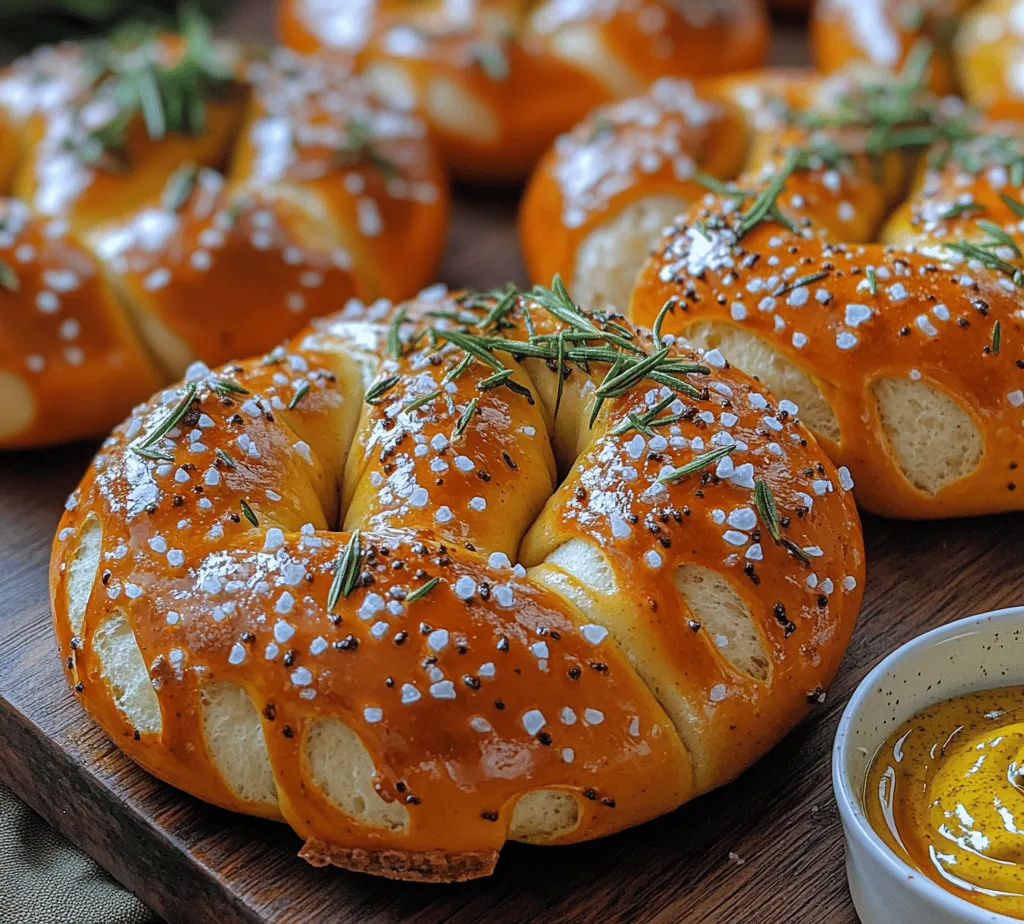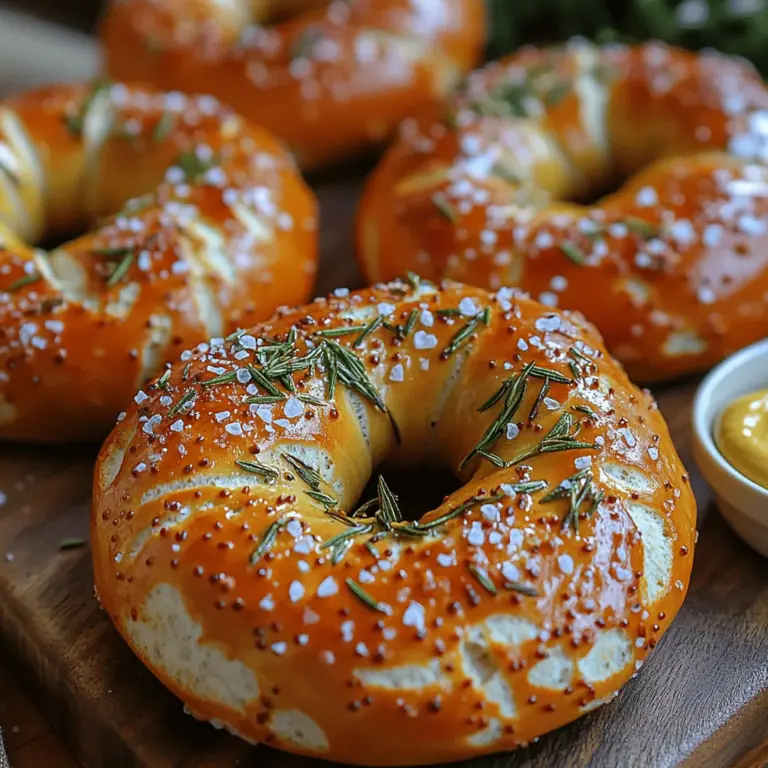Soft pretzels are a beloved snack, known for their warm, chewy texture and distinctive flavor. The simple pleasure of sinking your teeth into a freshly baked pretzel is an experience that transcends generations. This article delves into the delightful world of homemade Rosemary Sea Salt Soft Pretzels, providing a detailed recipe that not only showcases this classic treat but also elevates it with the aromatic essence of fresh rosemary and a sprinkle of flaky sea salt. Whether you are planning a family gathering, a cozy movie night, or simply want to indulge in a homemade snack, these pretzels are sure to impress.
Understanding the Basics of Soft Pretzels
What Makes Soft Pretzels Unique
Soft pretzels are characterized by their unique texture, which is both chewy and tender. The dough is typically made from flour, water, yeast, sugar, and salt, and it undergoes a special boiling process before baking that gives pretzels their iconic crust and flavor. This boiling step, usually in a baking soda solution, is what sets soft pretzels apart from hard pretzels and other types of bread.
In contrast to hard pretzels, which are crunchy and often enjoyed as a snack straight from a bag, soft pretzels present a delightful chewiness that makes them perfect for dipping in mustard, cheese sauce, or even chocolate. The flavor profile of soft pretzels is also more complex, allowing for the incorporation of various toppings and seasonings. In our case, the addition of fresh rosemary adds an aromatic flair, enhancing the overall experience.
The History of Pretzels
The history of pretzels dates back to ancient times, with origins believed to be traced to the early Christians in Europe. These early pretzels were made from simple ingredients and shaped into the form of crossed arms, symbolizing prayer. Over the centuries, pretzels evolved, becoming a popular snack food in various cultures, particularly in Germany, where they are often served at festivals and beer gardens.
The evolution of soft pretzels has seen them transition from traditional recipes to modern adaptations. In the United States, soft pretzels gained popularity in the 19th century, especially in Pennsylvania, where they became a staple at street fairs and sporting events. Today, they are enjoyed worldwide and come in numerous variations, including sweet and savory flavors. Our Rosemary Sea Salt Soft Pretzels represent a modern twist on this classic snack, combining traditional methods with contemporary flavors.
Ingredient Breakdown for Rosemary Sea Salt Soft Pretzels
Essential Ingredients
To create the perfect Rosemary Sea Salt Soft Pretzels, you will need the following essential ingredients:
1. All-Purpose Flour: The foundation of your dough, all-purpose flour provides the necessary structure and chewiness. For the best results, use high-quality flour that has a good protein content.
2. Active Dry Yeast: Yeast is the key ingredient that helps the dough rise, creating that light and airy texture we associate with soft pretzels. Ensure your yeast is fresh for optimal performance.
3. Warm Water: The warmth activates the yeast, helping it to ferment and produce carbon dioxide, which causes the dough to rise. It’s important to use water that is warm but not too hot, as excessive heat can kill the yeast.
4. Sugar: A small amount of sugar is added to feed the yeast and enhance the flavor of the pretzels. It also aids in browning the crust during baking.
5. Salt: This ingredient adds flavor to the dough. It’s crucial to use the right amount; too much can inhibit yeast activity, while too little can make the pretzels taste bland.
6. Baking Soda: Used in the boiling solution, baking soda helps develop the pretzel’s characteristic crust and deep brown color.
7. Fresh Rosemary: The star of our recipe, fresh rosemary infuses the pretzels with a delightful herbal aroma, elevating the flavor profile. The freshness of the herb makes a significant difference, so opt for high-quality rosemary.
8. Flaky Sea Salt: For topping, flaky sea salt adds a burst of flavor and texture to the pretzels, balancing the richness of the dough.
Optional Ingredients and Variations
While the above ingredients are essential for your rosemary pretzels, you can customize them with optional ingredients and variations:
– Cheese: Consider incorporating cheese into your pretzel dough or using it as a topping. Cheddar or Parmesan can add a savory twist.
– Garlic: For a garlicky flavor, mix minced garlic into the dough or brush melted garlic butter on top of the pretzels before serving.
– Dipping Sauces: Pair your pretzels with delicious dipping sauces. Mustard, cheese sauce, or a homemade garlic ranch dressing can take your pretzel experience to the next level.
Step-by-Step Guide to Making Rosemary Sea Salt Soft Pretzels
Now that you have a good understanding of what makes soft pretzels unique and the ingredients you’ll need, let’s dive into the step-by-step process of making your Rosemary Sea Salt Soft Pretzels.
Activating the Yeast
The first step in any pretzel-making adventure is to activate the yeast. This is a crucial process that ensures your dough will rise properly:
1. Measure Warm Water: Begin by measuring approximately 1 1/2 cups of warm water (around 110°F or 43°C). The water should feel warm to the touch but not hot—too much heat can kill the yeast.
2. Add Sugar and Yeast: Pour the warm water into a mixing bowl and add 1 tablespoon of sugar along with 2 teaspoons of active dry yeast. Stir gently to combine.
3. Let it Sit: Allow the mixture to sit for about 5-10 minutes. During this time, you should see small bubbles forming on the surface, indicating that the yeast is active and ready for use. If there are no bubbles, your yeast may be inactive, and you’ll need to start with a new batch.
Creating the Dough
Once your yeast is activated, it’s time to create the dough:
1. Combine Ingredients: In a large mixing bowl, combine 4 cups of all-purpose flour and 1 teaspoon of salt. Create a well in the center of the flour mixture, then pour in the activated yeast mixture along with 1 tablespoon of melted butter (optional for added richness).
2. Mix Together: Using a wooden spoon or your hands, mix the ingredients until they start to come together. The dough will be sticky at first, but don’t worry; that’s normal.
3. Kneading the Dough: Transfer the dough to a lightly floured surface and knead it for about 8-10 minutes. Kneading is essential as it develops the gluten structure, which provides elasticity and chewiness to the pretzels. The dough should become smooth and elastic, slightly tacky but not overly sticky.
4. Incorporate Fresh Rosemary: Once your dough is kneaded, finely chop about 2 tablespoons of fresh rosemary and gently fold it into the dough. This step infuses the rosemary flavor throughout the pretzels.
Rising the Dough
After kneading, it’s time to let the dough rise:
1. Prepare to Rise: Lightly grease a large bowl with oil and place the dough inside. Cover the bowl with a damp cloth or plastic wrap to retain moisture.
2. Let it Rise: Allow the dough to rise in a warm, draft-free area for about 1 to 1.5 hours, or until it has doubled in size. This rising process is crucial, as it creates the air pockets that give soft pretzels their light and fluffy texture.
As the dough rises, you can prepare your boiling solution and baking setup, ensuring you’re ready to shape and bake your pretzels once the dough has completed its first rise.
Now that you’re equipped with the foundational knowledge and initial steps for making Rosemary Sea Salt Soft Pretzels, you’re well on your way to creating a delicious, homemade snack that your family and friends will love. Stay tuned for the next sections, where we’ll cover the shaping, boiling, and baking processes that bring these pretzels to life.

Understanding the Fermentation Process
Fermentation is a crucial step in the pretzel-making process that directly influences the flavor and texture of the final product. During fermentation, yeast consumes sugars in the dough, releasing carbon dioxide and alcohol as byproducts. This process not only helps the dough rise but also develops complex flavors that enhance the overall taste of the pretzels. As the dough ferments, it acquires a rich, slightly tangy flavor profile, making every bite a delightful experience.
To achieve optimal fermentation, it’s essential to create the right conditions for the dough to rise. The ideal temperature for dough fermentation is between 75°F to 85°F (24°C to 29°C). At this temperature range, yeast activity is maximized, leading to a light and airy dough. A warm, draft-free environment is best for this process. You can create such conditions by placing the dough in a pre-warmed (but turned off) oven or by covering it with a damp cloth and leaving it in a cozy corner of your kitchen.
The Boiling Process: Key to Texture
Preparing the Boiling Solution
Once your dough has risen, it’s time to prepare for the boiling process, which is essential for achieving the signature pretzel texture. The key ingredient in the boiling solution is baking soda. When pretzels are boiled in a baking soda solution, they undergo a chemical reaction that creates a distinctive crust as they bake, resulting in that unmistakable chewy exterior and soft interior.
To prepare the boiling solution, fill a large pot with water and add about 1/2 cup of baking soda for every 10 cups of water. Bring this mixture to a rolling boil. The alkalinity of the baking soda helps to develop the pretzel’s color and flavor, contributing to the signature golden-brown crust.
Shaping the Pretzels
Shaping your pretzels correctly is crucial to achieving that classic pretzel look and texture. Here’s a step-by-step guide to help you shape your pretzels:
1. Divide the Dough: After your dough has risen, punch it down to release the air. Divide the dough into equal pieces, typically about 8 ounces each.
2. Roll into Strips: Take one piece of dough and roll it into a long rope, about 24 inches in length. Make sure to keep the thickness even throughout.
3. Form the Pretzel Shape: To shape the pretzel, form a U-shape with the rolled dough. Cross the ends of the U over each other to form a twist, then fold them down to the bottom of the U shape. Press the ends firmly to secure them in place.
4. Repeat: Continue this process with the remaining pieces of dough.
Common Mistakes to Avoid When Forming Pretzels
– Uneven Thickness: Ensure that the rope is of uniform thickness to promote even cooking and a consistent texture.
– Weak Twists: Be sure to twist the dough tightly enough to prevent it from unraveling during boiling and baking.
– Skipping the Boil: Never skip the boiling step. It’s essential for developing the pretzel’s unique flavor and chewy texture.
Baking Your Pretzels to Perfection
Oven Preparation
Preheating your oven is a vital step that should not be overlooked. A properly preheated oven ensures that your pretzels cook evenly and develop that golden-brown crust that everyone loves. Set your oven to 450°F (232°C) and allow it to heat up for at least 20 minutes before baking.
For added assurance that your pretzels bake evenly, place a baking stone or an inverted baking sheet in the oven while it preheats. This will help retain heat and provide a consistent temperature as you place the pretzels inside.
Tips for Achieving an Even Bake and Golden Color
– Use Parchment Paper: Line your baking sheets with parchment paper to prevent sticking and to allow for easy removal after baking.
– Space the Pretzels: Ensure there is enough space between each pretzel on the baking sheet to allow for proper airflow and even baking.
– Monitor Baking Time: Bake your pretzels for about 12 to 15 minutes, or until they are golden brown. Keep an eye on them, as oven temperatures can vary.
Seasoning and Final Touches
The finishing touches on your pretzels can elevate their flavor profile significantly. Once your pretzels are boiled and placed on the baking sheet, it’s time to add olive oil and seasonings.
Applying Olive Oil and Seasonings for Maximum Flavor
Before baking, brush each pretzel generously with olive oil to promote browning and enhance flavor. After brushing, sprinkle a mix of flaky sea salt and chopped fresh rosemary on top. The olive oil not only adds flavor but also helps the toppings adhere to the surface of the pretzels.
The addition of fresh rosemary not only complements the saltiness but also infuses the pretzels with a fragrant aroma that is simply irresistible.
Serving and Enjoying Your Homemade Pretzels
Cooling and Presentation
Once your pretzels have reached that perfect golden color, it’s essential to let them cool for a few minutes on a wire rack. This allows steam to escape and prevents them from becoming soggy. For an appealing presentation, consider arranging your pretzels on a rustic wooden board, garnished with additional sprigs of rosemary for visual appeal.
Creative Serving Ideas
– Pretzel Bites: Cut your pretzels into bite-sized pieces for a fun, shareable snack.
– Dipping Stations: Set up a dipping station with an assortment of sauces such as mustard, cheese dip, or a homemade garlic herb dip. This encourages a fun and interactive eating experience.
Perfect Pairings
To enhance your pretzel experience, consider pairing them with beverages and snacks that complement their flavors. Here are some recommendations:
– Beverages: A cold beer, particularly a lager or pale ale, pairs wonderfully with the salty, savory pretzels. If you prefer non-alcoholic options, try serving them with a refreshing lemonade or iced tea.
– Dipping Sauces: Besides mustard and cheese dip, consider a creamy spinach dip or a herbed yogurt dip to add variety and excitement to your pretzel experience.
Conclusion: The Joy of Homemade Rosemary Sea Salt Soft Pretzels
Making Rosemary Sea Salt Soft Pretzels at home is not only a culinary adventure but also a delightful way to bring people together. The combination of warm, chewy dough, aromatic rosemary, and flaky sea salt creates a treat that is perfect for any occasion, from family gatherings to game nights.
By following this comprehensive guide, you’ll be able to craft pretzels that are not only enjoyable to eat but also fun to share with friends and family. The satisfaction of pulling a batch of freshly baked pretzels from the oven, with their enticing aroma wafting through your home, is truly unparalleled. Whether you savor them fresh from the oven or serve them at your next gathering, these homemade pretzels will undoubtedly become a cherished recipe in your culinary repertoire. Enjoy the process, relish the flavors, and celebrate the joy of baking!


